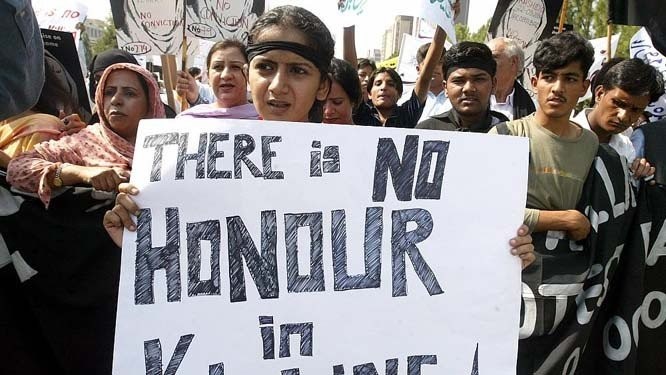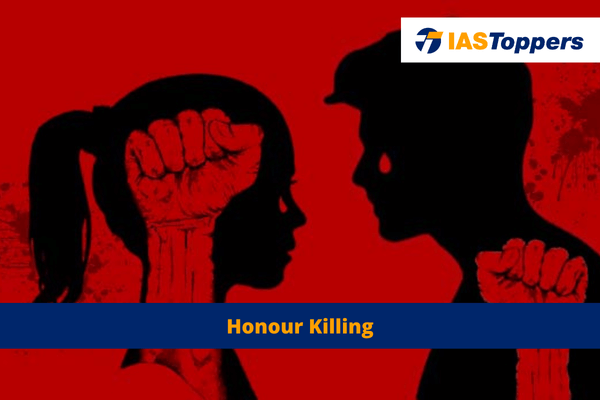Honour Killing is a form of murder or violence committed by an individual or family or community in order to safeguard what they perceive as their or their family’s dignity or honour. In this article, you will learn definition, cases of honour killing in India, reasons, constitutional provisions, solutions, providing key insights for GS Paper-II Polity and Governance of UPSC IAS Exam.
Table of Content
- What is Honour Killing?
- Where does Honour Killing occurs?
- What are causes of honour killings?
- Indian laws against honour killings
- Honor killing cases in India
- Why honour killings shall be banned?
- Steps to prevent Honour Killing
- Conclusion
- Frequently Asked Questions
- Reference
What is Honour Killing ?
- Honour Killing is a form of murder or violence committed by an individual or family or community in order to safeguard what they perceive as their or their family’s dignity or honour.
- Honour Killing is also known as shame killing.
- Honor killings mostly is associated with the murder of women or girls by male family members who believe that the victim’s actions have brought some of shame or dishonour to the family’s name, reputation, or prestige.
- This practice has been originated from tribal customs.

Where does Honour Killing occurs?
- It is prevalent in regions like the Middle East and South Asian countries, such as Bangladesh, India, Turkey, Syria, Morrocco and Pakistan.
- The state of Haryana, Punjab, Rajasthan, Maharashtra and Uttar Pradesh have most cases of honour killing.
- Honour based killings can also occur amongst the immigrant communities in countries that do not traditionally endorse such practices.
- It is often associated with rural and tribal areas, but these killings are not limited to such regions and can occur in urban areas as well.
What are causes of honour killings?
- Honour Killing is mostly linked to factors like religion, caste, hierarchical social structures, or sexuality.
- Honor killings arises from the refusal of certain individuals and families to embrace their children’s right to choose their own partners, irrespective of caste, religion, or societal norms.
- In such instances, family’s resort to the extreme act of murdering their own family members to avoid the stigma of a “love marriage” that may tarnish their family’s reputation.
Indian laws against honour killings:
Sections 299 to 304 of Indian Penal Code:
- It punishes individuals found guilty of murder and culpable homicide not amounting to murder.
- The penalties consist of either life imprisonment or the death penalty, along with a fine.
- When culpable homicide does not result in murder, the punishment can be either life imprisonment or imprisonment for 10 years, along with the fine.
Indian constitution:
- Articles 14 and 15 stands for the principle of equality before the law.
- This signifies that every individual, irrespective of their caste, creed, sex, race, or religion, should receive equal treatment under the law.
- Articles 14: The State shall not deny to any person equality before the law or the equal protection of the laws within the territory of India.
- Articles 15: The State shall not discriminate against any citizen on grounds only of religion, race, caste, sex, place of birth or any of them.
- The honour killings, are frequently perpetrated against female familymembers, indicating a lack of parity before the law.
- This violates the principle of equal treatment.
- Articles19 and 21 of the Indian Constitution provides the freedoms of expression and the right to life, respectively.
- These two fundamental rights are compromised in cases of honour killings.
- Articles 19: Right to speech and expression, assembly, association, movement, residence, and profession.
- Article 21: Right to life and personal liberty
Honor killing cases in India:
Manoj-Babli Case:
- The khap panchayat has favoured against the couples who have eloped due to different caste.
- The decision taken were on the basis of religion and caste.
- The Punjab and Haryana High Court had given life sentence to the accused of honour killing.
- This is the first honour killing case in which life sentence was given.
Shakti Vahini vs. Union of India (2018)
- The Supreme Court (SC) has given the following guidelines to eradicate the practice of honor killings in India:
- Two consenting adults are autonomous in their decision to marry, and such a choice does not necessitate consent from any external party.
- Any endeavor by Khap panchayats or family members to impede the marriage of consenting adults is unlawful.
- The concept of “class honor” should not impede an individual’s right to personal choices as it is a privilege safeguarded by Indian Constitution.
- Any act of honor-related violence that curtails the freedom to choose a love marriage is illegal and infringes an individual’s dignity, contravenes Article 21 of the Indian Constitution.
- When two adults willingly enter into matrimony, they are exercising a constitutional right, and any encroachment upon this right is a constitutional violation.
Kartar Singh vs. the State of Punjab
- The SC has stated that “Honor killing disrupts an individual’s liberty, their freedom to choose, and their own perception of choice.”
State of Maharashtra vs. Eknath Kisan Kumbharkar (2019)
- The honor killings have spread across the nation, with more prevalent in regions like Haryana, western Uttar Pradesh, and Rajasthan.
- Couples are often compelled to seek refuge in police stations or protective shelters to escape the clutches of extrajudicial tribunals.
- The SC has advocated for the death penalty as a deterrent against such reprehensible behavior.
Why honour killings shall be banned?
- Honour killings practice places an unfair burden on daughters, as their family’s honour becomes solely dependent on their actions, which disregards their autonomy and preferences.
- In some families, daughters are confined to the household where they solely have to focus on their studies, and are expected to eventually marry someone chosen by their family.
- Each person possesses the inherent right to choose their life partner, an entitlement that cannot be encroached upon.
- The inviolability of an individual’s freedom and right to life must not be infringed.
- The Women and Child Rights Planning Commission in the 12th five-year plan has stated that the existing provisions in the Indian Penal Code (IPC) has proved inadequate to tackle honor killings.
Steps to prevent Honour Killing:
- The Prevention of Crimes in the Name of ‘Honour’ and Tradition Bill of 2010 must be passed as the SC has stated that parental or Khap Panchayat interference in the marriage choices of adult couples are unconstitutional.
- Establish a comprehensive, self-sufficient law, prescribing equitable penalties for wrongdoers, plotters, and instigators.
- The Women and Child Rights Planning Commission has recommended punitive measures against any public endorsement or glorification of harassment or murder in the guise of honor.
- This underscores the demand for a distinct legal framework to combat such crimes.
- An amendment to the Hindu Marriage Act of 1955 is required, which had disallowed marriages within the same “gotra.”
Conclusion
Efforts to eradicate honour killings must be a multi-faceted approach, involving legal reforms, education, awareness campaigns, and community engagement. The battle against honor killings is a battle for human rights, gender equality, and social justice. It is imperative to foster conversations that lead to change, and stand united against this grave violation of human rights. Solution for honour killing in India must be achieved as quickly as possible in order to make India a modern society.
Ref: Source-1
| Other Related Articles in Social Issues | |
| Abortion Laws in India | Healthcare Sector in India |
| Feminization of Agriculture | Euthanasia |
| Same Sex Marriage in India | Naxalism in India |
FAQs (Frequently Asked Questions)
What do you mean by honour killing?
Honour Killing is a form of murder or violence committed by an individual or family or community in order to safeguard what they perceive as their or their family’s dignity or honour.
Which case of Supreme court has laid down the guidelines against honour killing?
Shakti Vahini vs. Union of India (2018)
What is khap panchayat-based honour killing?
When khap panchayats orders the Intentional killings of couples due to intercaste, intra-clan, and within-village weddings that are in contradiction to their ethics.
Which state has the highest honour killing in India?
Although honour killing cases are more prevalent in a few North Indian states, like Uttar Pradesh, Bihar, Rajasthan, Haryana, Jharkhand and Punjab, it is being increasingly reported in the South too, including Karnataka.
What is the reason for honour killing?
The main reason for commitment of an ‘honour killing’ is belief that any member of family had brought dishonour to the family.


